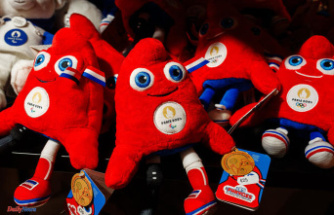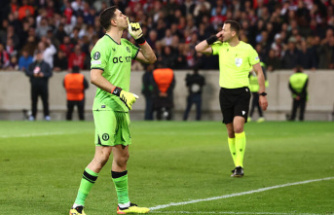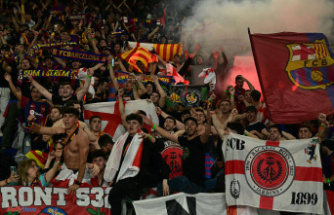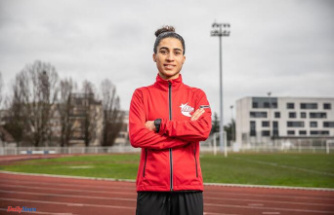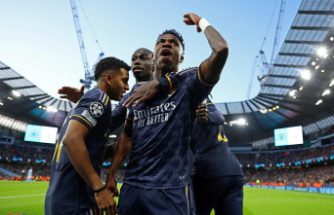The German track and field team returns from the World Championships in Eugene with just two medals. In addition to poor performance, the association's communication is also irritating. And raises the question of whether the problems are of a structural nature.
What's going on in German athletics? The World Championships in Eugene ended with a series of disappointments and a historically poor medal result. Gold for long jumper Malaika Mihambo and bronze for the women's sprint relay, that's it. For head coach Annett Stein and Jürgen Kessing, President of the German Athletics Association (DLV), this not only causes massive disillusionment, but also leads to a surprisingly clear reckoning with half of the World Cup team. "40 to 45 percent of the athletes did not call up their performance potential. We are not satisfied with the outcome of the World Cup, we did not expect that." A crashing verdict.
But was that really not to be expected? Well, the home European Championship in three weeks in Munich will provide an answer at the latest. The positive reading of Eugene's disappointment would then be: A large proportion of the German athletes used the World Cup as a way station to build up their form and see the competitions in front of their home crowd as the highlight of the season. But if you're honest, that's more of a bold thesis. Structural errors in association policy seem more likely.
Long jump icon Heike Drechsler also warns of this. Already halfway through the World Cup, in an interview with the "Thüringer Allgemeine", she called for a rethink in the association as a consequence of the disappointing results. Professional structures would have to be created, trainers better paid and top athletes financially secured. "We're losing touch with the world leaders. German athletics have to be careful not to go under." Drechsler also criticizes the fact that "no one in the association currently attaches great importance" to the experience of former top athletes.
Meanwhile, ex-association boss Clemens Prokop does not share concerns about the demise of German athletics. It, that is, athletics, has been certified as having an excellent structure for promoting performance. "It's number one in the ranking of sports in Germany. That's a sign that good work is being done." There have always been fluctuations in performance. Now it is important to absorb these fluctuations, the "Sportschau" quotes him as saying.
But even if the athletes in Eugene were not able to exploit their potential in far too many cases, the question also arises to what extent the immediate preparation for the World Championships coordinated by the association was suitable. In other words, whether the DLV offered its nominees optimal conditions to achieve best performances at the season's highlight. In view of the meager record, that seems at least questionable and falls under Stein's area of responsibility as head national coach.
As ntv.de has learned from those close to the national team, there is repeated criticism internally of DLV filling the national coaching position and how these national coaches interpret their role. You move in the dichotomy of looking after your own athletes as a home trainer and being responsible for their competition as a national coach. According to sources in the DLV environment, this situation is exacerbated by the fact that, as part of the competitive sports reform, athletes are being forced from the area to the federal bases - and are thus separated from their home trainers and assigned to the national trainers.
Then there is the question of expectation management. Head national coach Stein said about halfway through the competitions in Eugene that the DLV apparently "didn't succeed" in "putting this World Cup in the focus of most athletes". What she promoted the debate, many nominees see the World Cup only as a stopover in the EM preparation. And what, despite all the reassurances from the association, sounds like a debacle with an announcement.
raises questions about internal targets and performance expectations - exemplary? - the German men's 4x400 meter relay. Their national coach apparently told local journalists that the German quartet had no chance of qualifying for the final anyway. At least that's what the TV commentary on the prelim suggests, which always referred to preliminary talks with the national coach. The German 4x4 ran 3:01.96 minutes last year - which would have been enough in Eugene for the confident entry into the final.
Maybe that's why internal criticism of the occupation of the coaching posts seems to be growing. This is also indicated by the fact that top German athletes are migrating abroad. Sprinter Gina Lückenkemper has joined a training group in Florida, exceptional runner Konstanze Klosterhalfen has been training in Oregon for years. Malaika Mihambo got in the way of the pandemic: Actually, her move to US track and field legend Carl Lewis in Texas was already a done deal, but the initially planned collaboration with national coach Ulrich Knapp has proven to be extremely successful.
Structural problems also seem to be behind the new German weakness in the throwing disciplines, which has guaranteed medals in international title fights for many years. Only javelin thrower Julian Weber reached the men's final, in the discus throw and shot put all four Germans were eliminated in the qualification. In shot put, the distance to the world's best can probably also be explained by the fact that the DLV has relied on the planing technique for years, while the competition has rushed away with the currently prevailing twist shot technique.
Of course, the athletes also have to face criticism as to why their performance at the peak of the season is so bad. The bigger question, however, is whether the German Athletics Association forces its athletes into structures that do not allow them to perform better.


